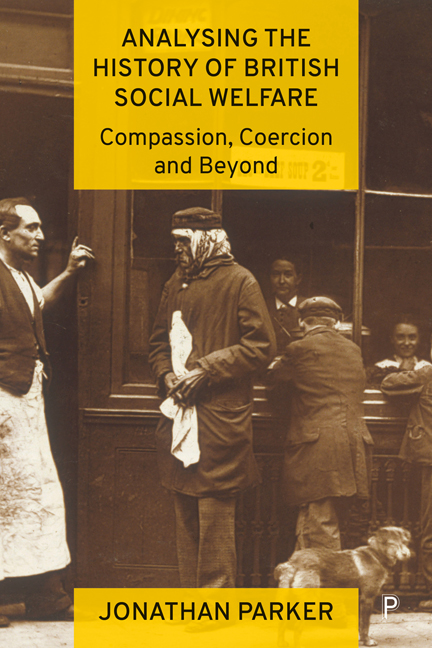Book contents
- Frontmatter
- Contents
- List of tables
- List of abbreviations
- About the author
- Acknowledgements
- 1 Concepts, continuities and critique
- 2 A brief history of British social welfare
- 3 Philosophical binaries and normative judgements
- 4 Chocolate, flowers and social welfare reform
- 5 War: the paradoxical crucible of welfare reform
- 6 Gendered perspectives on welfare
- 7 Piacular austerity: sacrificing the poor for the rich
- 8 Universal Credit versus Universal Basic Income: strange bedfellows?
- 9 Universal Credit versus Universal Basic Income: strange bedfellows?
- 10 W(h)ither welfare after Brexit and COVID-19?
- References
- Index
5 - War: the paradoxical crucible of welfare reform
Published online by Cambridge University Press: 20 January 2024
- Frontmatter
- Contents
- List of tables
- List of abbreviations
- About the author
- Acknowledgements
- 1 Concepts, continuities and critique
- 2 A brief history of British social welfare
- 3 Philosophical binaries and normative judgements
- 4 Chocolate, flowers and social welfare reform
- 5 War: the paradoxical crucible of welfare reform
- 6 Gendered perspectives on welfare
- 7 Piacular austerity: sacrificing the poor for the rich
- 8 Universal Credit versus Universal Basic Income: strange bedfellows?
- 9 Universal Credit versus Universal Basic Income: strange bedfellows?
- 10 W(h)ither welfare after Brexit and COVID-19?
- References
- Index
Summary
War may not be something that one would immediately associate with welfare, although it may perhaps appear, on a superficial level, to be a fairly simple concept to define. Wars are conducted by nations or states against other nations or states, and the actions of war have been mandated by at least one of the states’ governments. Oppenheim's (1912, p 60) classic definition states: ‘War is the contention between two or more States through their armed forces for the purpose of overpowering each other and imposing such conditions of peace as the victor pleases.’ Warfare, therefore, concerns engagement in and the prosecution of armed state struggle. However, it is not quite so simple. Wars can be large or small, involve many or just two nations and the violent actions of armed militia may be conducted by groups other than nations or states. They may be historical and perhaps not always ended by treaty (for instance, the, possibly apocryphal, story of Berwick-upon-Tweed on the English– Scottish border remaining at war with Russia because of its omission from the peace treaty signed in respect of the Crimean War [see Kiely et al, 2000]). It is also the case that war, while usually concerned with open expression of hostilities by states towards one another, is also enacted between or against stateless peoples, or between groups within a state as a ‘civil war’. Dinstein (2017) exposes many of the tensions in this slippery concept from his analysis of war recognising the many uses of the term, and the difference in use by domestic states and international law. However, as a violent contention between two opposing groups war will result in an increase in need and demand for certain social and citizen entitlements, notably those concerned with social welfare, health and security. Indeed, one can think back to developments in health care emerging from the Crimean War and celebrated in the figures of nursing pioneers Mary Seacole and Florence Nightingale.
Dinstein (2017) also acknowledges its use as a figure of speech in common parlance when describing any serious struggle in which people or states engage, such as the ‘war on drugs’, ‘poverty’ or ‘disease’
- Type
- Chapter
- Information
- Analysing the History of British Social WelfareCompassion, Coercion and Beyond, pp. 82 - 95Publisher: Bristol University PressPrint publication year: 2023



